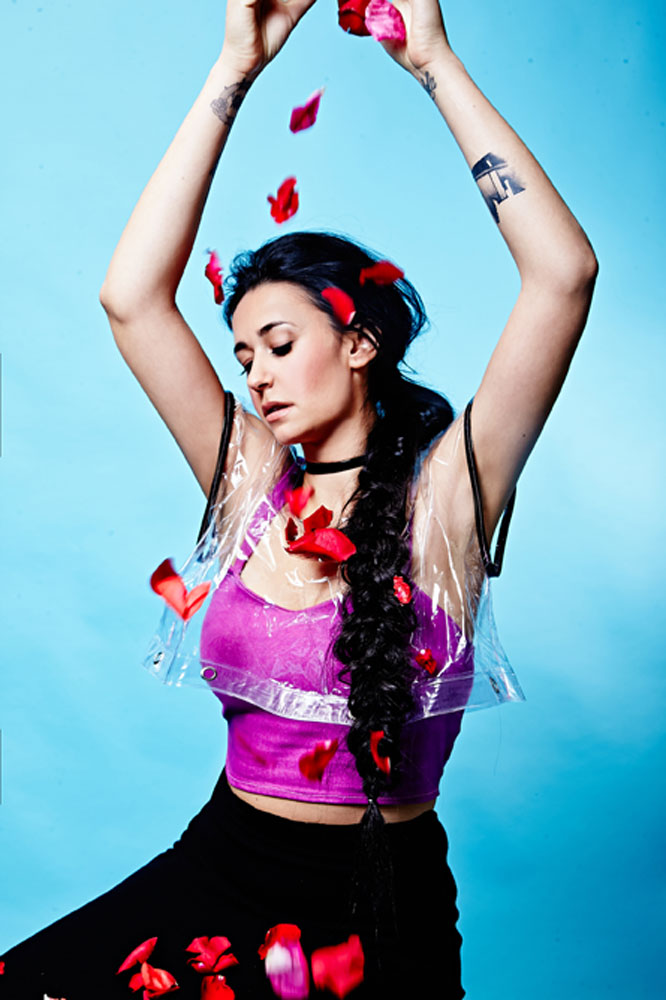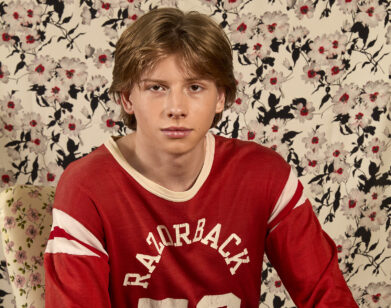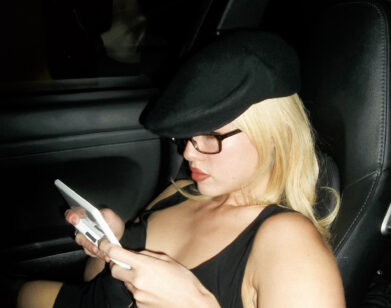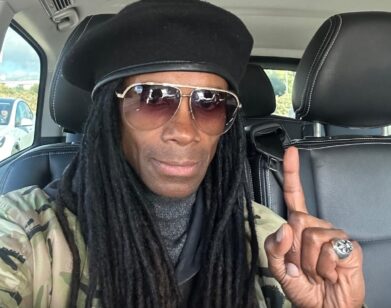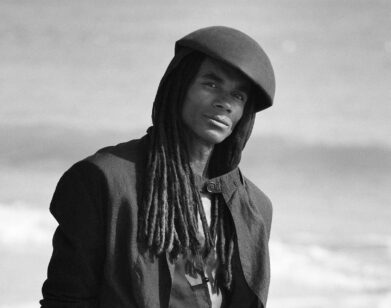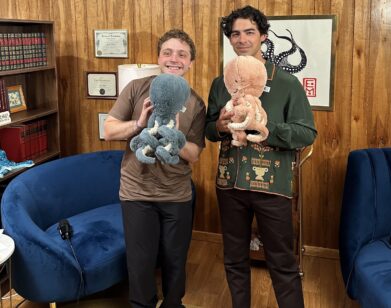Exclusive Video Premiere: ‘My Garden,’ Kat Dahlia
KAT DAHLIA IN NEW YORK, JANUARY 2015. PHOTOS BY CHARLIE HIMMELSTEIN. STYLING BY LESTER GARCIA. MAKEUP: CAITLIN WOOTERS FOR NARS COSMETICS. HAIR: KAT ZEMTSOVA USING ALTERNA HAIRCARE. PHOTO ASSISTANT: NATHANIEL DAM. STYLING ASSISTANTS: ANTOINETTE GOLDMAN AND CHAD PITTMAN.
Less than a year ago, singer, songwriter, and rapper Kat Dahlia’s fate was uncertain. She canceled a worldwide tour, changed her phone number, and essentially disappeared from a once very active social scene. She could hardly speak, let alone sing. “It took a big emotional toll on me. I went to the doctor, who said it was a pseudocyst [on my vocal chords], and I literally put myself into a cocoon for four months,” she says. But after four months of near solitary confinement, Dahlia’s voice suddenly came back.
Born in Miami to Cuban parents, the 24-year-old artist began rapping at the age of eight and writing original songs by age 15. Three years later, she packed up and moved to New York without a plan, soon thereafter becoming involved in a toxic relationship that became the basis of her just-released debut album, My Garden (Vested in Culture/Epic Records). Her sultry and raspy vocals are paired with music produced by Timbaland, Missy Elliott, and Salaam Remi to create tracks imbued with catchy loops that verge on the edge of dark pop, but simultaneously evoke notions of Rihanna-meets-Nelly Furtado and resonate on an emotional level.
In the titular track from the album, Dahlia croons “I’ll let your rain fall down if it sparkles like diamonds / just let me wear the crown / my garden’s appetizin’,” speaking frankly about a woman inviting men into her life solely for the sake of money. In the video for the song, which is exclusively premiering below, Dahlia surrounds herself with nothing but snakes, flowers, and objects of desire. The visuals allow for multiple interpretations, echoing the lyrics’ inherent duality.
We spoke with the artist about the concept of the video, producing the album, and what’s to come.
EMILY MCDERMOTT: What made you want to be the only person in the video rather than including other people?
KAT DAHLIA: [laughs] I don’t know if you’ve seen Great Expectations–the 1998 version with Gwyneth Paltrow and Robert De Niro–but basically Miss Havisham is this older, super glamorous woman living in this old, old house by herself. It’s this big beautiful house, but it’s overgrown with vines and bushes. She was heartbroken years ago, left at the altar on the day of her wedding, so the house is literally left as is since the day of the wedding. She hasn’t touched it. She kind of went crazy, living in this house alone. I was inspired by the whole idea of this glamorous, over the top, very dramatic woman that lives alone in this house with this garden and she’s inviting people in. As glamorous as she is, there’s also a darkness, eeriness, and sadness to it. That’s where I was inspired originally for the treatment and when I got with [Michael] Garcia, the director, he took it on another level. He found this amazing location in Miami and we started from there. I didn’t think too much of it; I didn’t really see other people in the video, you know? I saw more of just this story of a woman.
MCDERMOTT: That comes through in the lyrics, how this woman invites men into her life because of wealth instead of any real feeling. But then the snake–snakes can represent so many different things. What does it mean for you?
DAHLIA: Honestly, snakes can be interpreted in so many ways. I’ve had some snakes in my garden that I’ve had to run out of my life, but snakes can also be very strong, a strong image. Snakes in their nature are very independent. They don’t have many dependencies on anything, right? They eat like once a week, they aren’t very attached to anything worldly, so the dynamic of snakes and then this woman that is attached to all these worldly things, I like those together. It’s a really strong, eye-catching image. The video and the song can be very sexual, but these snakes make it a little scary and eerie. It’s like you’re scared, but turned on at the same time. I like those two emotions together.
MCDERMOTT: I know there were some snakes you had to wrestle with in your life. I read the album was inspired by an abusive relationship you were in. How did that influence you and how have you grown since?
DAHLIA: Well, I got into a relationship years ago–at this point it’s been like three years–and it wasn’t what I expected. Sometimes you get into situations and they’re big illusions. When you start peeling back the layers, you start to see the truth. In other words, there were a lot of demons in this person that I didn’t realize were there. I saw myself in this world with him and taking on all of his demons as well. It was hard to let go of that because, as a female or as people in general, we like to feel needed. So it’s so hard to walk away because I did feel needed in that situation; I felt dependent and dependable. It was a really rough time, it was hard to get away, but ultimately as long as you put a person on a pedestal and are like, “I’ll never meet anybody that I have a connection with, da-da-da-da,” those things aren’t as special as you make them out to be. It took a long time, but I finally found happiness within myself and not in a relationship.
MCDERMOTT: So were you writing these songs while you were in the relationship? Or after?
DAHLIA: It was during and after the relationship. A lot after, a little bit during, but it was so hectic during I didn’t have a lot of time to think about writing.
MCDERMOTT: It’s obviously difficult to walk away from a relationship, but what were some of the things that helped you walk away and move on?
DAHLIA: Initially it was just the physical distance. He moved away, so that really helped. It really sucked and it hurt and I felt lonely and all that crap. But I think what ultimately got me out of it was I went back and he was with this other girl. This other girl hated me, and then he got back with me, but then I found out he was still talking to her. This girl was in a very dark place, their dynamic was really weird. I looked at the whole situation objectively and was like, “Why did I get myself into all of this drama? I’m at a good place in my career, everything is going well, and I’m just fucking around, just messing around with this, even though I know it isn’t going to work out.” I think that’s what got me to finally walk away. It’s one thing if you’re a drug addict, but I won’t stick by you if you’re talking to another girl. If you’re cheating on me with drugs that’s one thing. If you’re cheating on me with a girl, mmm, I’m good. I don’t want any bullshit.
MCDERMOTT: I know the album was originally supposed to come out last year, but then you had problems with your vocal chords and had to have surgery?
DAHLIA: It happened about a year ago. My voice was not feeling right. You know, sometimes you go out drinking and wakeup the next day–”Oh yeah, I’m hungover. My voice is a little raspy, but whatever. It gets back to normal and I can sing the notes.” But this time it wasn’t happening and I knew something was wrong. I was like, “I’ve been working so much. I’m just over-singing, working, working, working, and not sleeping enough.” Then one day it hit me. I was like, “Something’s wrong, guys. Something’s wrong.” We had to cancel the tour, which was devastating. I changed my number. I completely cut almost everybody out of my life so I could breathe and reflect and focus on what I needed to. I’m kind of a people pleaser–I take on people’s interests and desires in front of my own, and I needed to not focus on anybody, kick off bad habits, and relax, work on my voice. I got vocal therapy for a few months, got really, really healthy, and all of a sudden I got my voice back. It was a big rollercoaster. Some days I was like, “I’m gonna get it back, I’m gonna get it back.” But there were other days where I was worried I would have to start waiting tables, like, “I gotta start looking for a job.” There were a lot of ups and down, but it worked out and was really the time that I needed.
MCDERMOTT: What would you say you discovered about yourself in those four months of isolation?
DAHLIA: I realized a lot of things about myself, one is that I put other people’s needs ahead of my own. I really like to be social and go out, and I guess my priorities weren’t right. I tend to keep my mouth shut too much and then I’ll write a song about it or I’ll end up overworking myself to the point that I can’t sing anymore. A lot of those things I’m still working on. A lot of times I’ll still let things pass, and pass, and pass, and I won’t say anything, until one day it will blow the fuck up. I need to work on that. [laughs] I realized that the only thing I really did love was music and that was the only thing I wanted to do, not this other shit. There isn’t really anything besides music that makes me feel wholesome and nourished. I feel like the only thing that nourished me was music. There was nothing else. If I didn’t do music, I was gonna be really fucking miserable.
MCDERMOTT: You started rapping when you were eight and then started writing when you were 15. How did you first become interested in rapping and music?
DAHLIA: Me and my brother and sisters used to just mess around and make these stupid little raps at home when we were bored. We loved making stupid songs and making things rhyme. I always had an affinity for poetry and words. I loved it. So really, it just started off as a fun hobby that we loved to do. Then I took it a lot further.
MCDERMOTT: What’s one of the songs you and your siblings wrote?
DAHLIA: We wrote a remix to the Sublime’s “[Waiting For My] Ruca.” It was talking about how we were bored at home waiting for the pizza. Literally, one of the lyrics was like, [starts singing] “And we’re bored. We’re so damn bored. And we’re waiting for the pizza.” We were really young. We just wrote dumb stuff, man. We wrote another song, it was a rap, talking about how I pick on my sister. We did both sides, so I was like, [starts rapping] “My name’s Katie and da-da-da-da,” and then Valerie was like, “Hey I’m Valerie, the little sister that she beats,” [then I would be like], “I never did anything! She’s so special to me.” [laughs] Every other weekend we would be with my dad just hanging around the house, watching TV. We’d get bored, you know? So we started pulling up instrumentals–on dial-up, we’d sit by the computer and wait for the [makes dial-up noise], then login, and do stupid remixes to songs. It was really just a way to pass the time.
MCDERMOTT: Does your sister still do music? Would you ever consider doing something with her now?
DAHLIA: She’s in school now. She’s in college. My other sister, my brother, everyone honestly got very business-y on me, except my older brother. He’s writing and still plays the guitar, so sometimes we’ll jam out. And my little sister, she comes on tour with me sometimes. She’ll travel with me and she does love to sing, but I think she’s still trying to figure it out.
MCDERMOTT: Do you play any instruments?
DAHLIA: I don’t. I played the drums for a little while, but we moved into another tiny apartment and then I kind of got nothing out of it.
MCDERMOTT: So this album has been a long time coming. How do you feel like you’ve changed since you first released “Gangstas” in 2013?
DAHLIA: I’ve learned a lot about the industry. I’ve learned a lot about making records. I’ve learned about myself. I’ve had so many life expriences and those experiences create you little by little. You’re never going to be the same person you were yesterday, right? I don’t think I’ve changed so, so much, but I’ve definitely gone through some more traumatic things that really changed my way of seeing.
MCDERMOTT: Aside from the thought of losing your voice, what is one of the biggest struggles you’ve overcome?
DAHLIA: Not worrying about other people’s judgment. I used to not give a shit, and then I started giving a shit, and then I stopped giving a shit again.
MCDERMOTT: When did you start caring?
DAHLIA: The pressure from people’s expectations starts to sink in and then you start worrying about whether you’re good enough, all this stupid, superficial bullshit. I have to stop and remind myself, “Whoa, whoa, whoa, whoa, wait a minute. I’m kind of the shit. I’m good.” No mater what, people are gonna fuck with me, then they’re gonna fuck with me more, and I don’t really care. I’m not gonna be there just trying to create something that’ll make everybody feel like, “Oh my god this is a hit!” That pressure of making a hit–no, I’m just going to make a fucking amazing album and something that the fans enjoy. I’m gonna be loyal to the fans. I’m not gonna be there trying to make some generic shit that the masses are going to love for the moment. What does that really do for anybody? What does that do for me? Is that going to make me happy–this generic, formulaic little hit that’ll make everybody bob their head? No. It’s going to be the shit. When I stuck to that, other things fell into place.
MCDERMOTT: What are you working on now?
DAHLIA: I just finished a song yesterday, actually, that’s really fucking good. I don’t really want to talk about it because I want to focus on this album! [laughs] But I mean, I think it’s really good and really huge. I don’t wanna wait three years for everybody to hear it, so I’m working on the second album now and really getting it out, probably, by the fall. I just want to have another album out. I don’t want to wait a really long time, because you never know when a pseudocyst just pops up into your life and decides to lag everything.
FOR MORE INFORMATION ON THE ARITST, VISIT HER WEBSITE.

